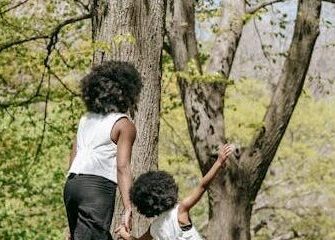Features
Ranti Fatoye: Teaching Children to Respect Elders
 An author once said “Children have never been very good at listening to their elders, but they have never failed to imitate them.”Children are mirrors; they reflect back to us everything we say and do.” We now know that 95% of everything children learn, they learn from what is modeled for them. Only 5% of all they learn is from direct instruction. Human beings are like tape recorders. Every word we hear, everything we experience, is permanently recorded in our subconscious.
An author once said “Children have never been very good at listening to their elders, but they have never failed to imitate them.”Children are mirrors; they reflect back to us everything we say and do.” We now know that 95% of everything children learn, they learn from what is modeled for them. Only 5% of all they learn is from direct instruction. Human beings are like tape recorders. Every word we hear, everything we experience, is permanently recorded in our subconscious.
Whenever adults speak, we are being role models for the children in our presence. What we speak is what we teach. Children record every word we ever say to them or in front of them. The language children grow up hearing is the language they will speak. We often make the mistake of thinking that since children are smaller than we are and have less information and experience than we do, that they don’t have all the same feelings we do. But they do.
The same kind of treatment that would embarrass, humiliate or hurt us, embarrasses, humiliates and hurts children. When human beings are being hurt emotionally, when our thinking is shut down we cannot learn, we can only record. When adults try to “teach” children by criticising, lecturing, shaming, ridiculing, giving orders, screaming, threatening and hitting, it shuts down their thinking so they can’t learn what the adult intended to teach them to do or not to do; they can only record what is being modeled.
The most common criticism I hear of young people these days is, “They don’t treat anyone or anything with respect.” Ironically, adults often try to teach children to be respectful by treating them disrespectfully. Children learn respect or disrespect from how we treat them and how we treat each other. When children live with disrespect, they learn disrespect. We can teach respect only by modelling the act of treating each other with respect, and by giving children the same respect we expect.
Since children have long been treated as second class citizens, as “less than,” most adults carry “recordings” of disrespect we recorded when we were children. When children’s behavior challenges us, it pushes our recording’s play button and we find ourselves saying the very things that were said to us as children. Has any parent not had the experience of hearing their parents’ words coming out of their own mouths now that they are parents? Most disrespectful responses are so automatic; we have already said them before we even realize what we’ve said.
Learning to treat children with respect will require a change of heart, which can come only from a major shift in consciousness of how we view children and how we define respect. Children are born with human dignity. To treat a person with respect is to acknowledge and preserve their human dignity. To treat a person with disrespect is to attack their human dignity.
Treating children disrespectfully is like using physical punishment as discipline; it only “works” as long as we are bigger than they are. It behooves every adult who wants to be treated with respect to treat children respectfully. Whether children grow up under our roof or not, they live in the same world we do and their behavior can and does impact our lives. However we treat the child, the child will treat the world.
How can we expect children to understand and practice the Golden Rule if we treat them with less respect than we give our peers? In saying that children deserve the same respect we would give our friends, I am not saying we should treat children like adults or that we should never get angry. I’m saying that there is nothing we ever have to say to a child that we need to say in a disrespectful way.
Screaming at, belittling, embarrassing and humiliating children is disrespectful. If we question whether or not something we have said to a child is disrespectful, we can ask ourselves, “Would I say those words, in that tone of voice, to my good friend?” If not, it was probably disrespectful. When we model disrespect, we must then model apologizing.
If we are sincere about teaching respect to children we must expose, acknowledge, and work on eliminating all the ways that we model disrespect. Even if we do not model the blatantly disrespectful behaviours of criticising, lecturing, shaming, ridiculing, giving orders, screaming, threatening and hitting, there are many things we do, and say to children, that have been said and done to children for so long, we aren’t even aware that they are disrespectful. Yet, if these same things were said or done to us we would identify them as disrespectful.
Photo Credit: Bernardo Ertl | Dreamstime.com





















